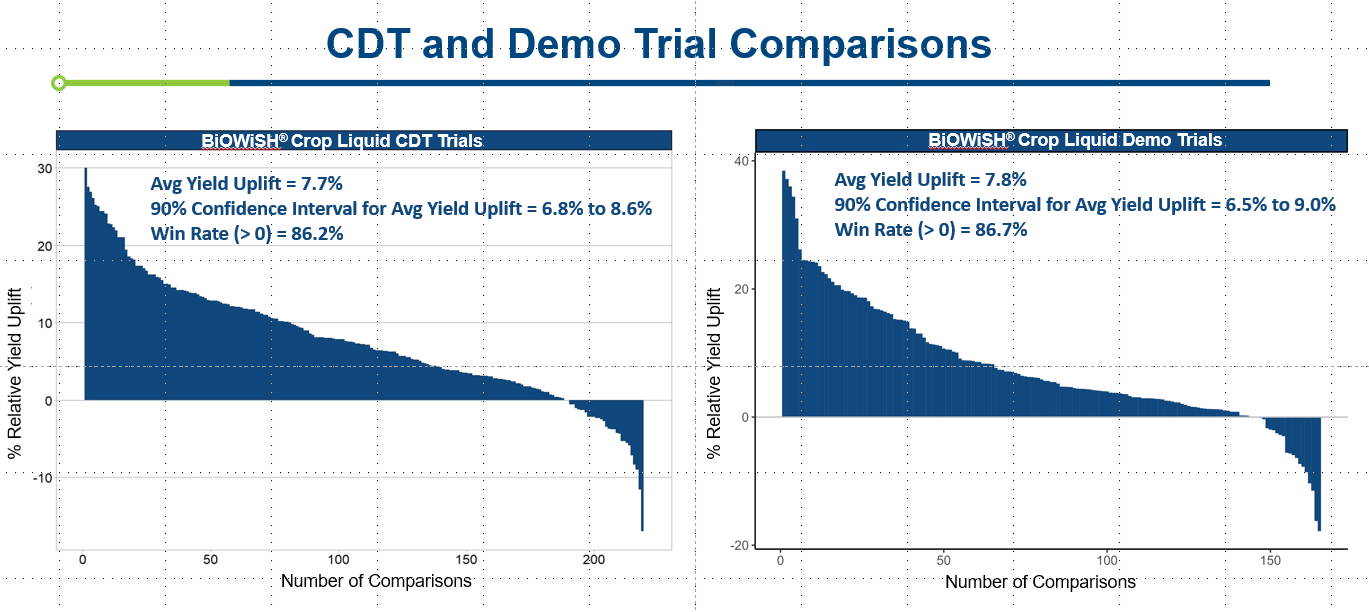Agricultural practices vary significantly around the world depending on many critical factors including climate, terrain, tradition, and accessible technology. While the United States, Brazil, Europe and Australia have many large-scale farms that rely on heavy machinery, many parts of Asia and Africa contain small-plot farms that require more labor-intensive, manual cultivation. Regardless of farming practices and conditions, BiOWiSH® Enhanced Fertilizer helps farmers around the world optimize yield potential by improved nutrient uptake to boost agricultural productivity.
This three-part series will explore how BiOWiSH® Fertilizer Enhancement supports a of broad range of crops, soil types, climates, and management practices, to help farmers worldwide improve their fertility programs successfully and consistently, while achieving a high return on investment.
Part 1: Crops – Optimizing Yield Potential to Maximize Profit
Natural, safe, and non-GMO, BiOWiSH® utilizes HoloGene 3™ technology, a blend of proprietary microbial cultures coated onto dry fertilizers or mixed with liquid fertilizers to create a new class of Enhanced Efficiency Fertilizer. BiOWiSH has a unique multi-stage approach to our product development and manufacturing. One critical output of our process is BiOWiSH® endophytic Bacillus deliver soil nutrients to crops through the rhizophagy cycle, creating a symbiotic relationship between the plant and soil microbes. BiOWiSH® enhances beneficial microbes in the rhizosphere, optimizes soil conditions for greater root mass and improves soil conditions for increased plant vigor. This optimizes yield potential by improved nutrient uptake, making the BiOWiSH® Fertilizer Enhancement an effective addition to fertility programs for a wide variety of crops – allowing farmers to maximize their fertilizer investment and increase profit.
Proven Performance, Value, and Profit
Committed to research and development (R&D), BiOWiSH Technologies has an extensive library of research and case studies. It has conducted hundreds of replicated research trials with various Contract Research Organizations (CRO) on various crops, soils, and environments, which support its proven performance and profitable results across different management practices and economic conditions. An example of how our CRO research translates to real-world farming is a summary of 16 on-farm demo trials in the Midwestern United States using BiOWiSH® Enhanced Fertilizer on corn that led to an average profit increase of $58 per acre over a standard fertility program. This equates to a profit increase of $116,000 for a 2,000-acre farm.
Beyond corn, BiOWiSH Technologies has conducted research on crops in different segments including row crops, vegetables, and high-value crops worldwide. Below are the results when comparing BiOWiSH® Enhanced Fertilizer to the grower’s standard fertility program in various regions.
Row Crops: This class includes crops grown and sold as commodities at a large scale. Examples are corn, cotton, rice, sorghum, soybeans, winter wheat, durum wheat and spring wheat. See findings from various BiOWiSH® broad acreage studies below:

Vegetables: Farmers produce vegetables for the fresh market and processing. Commonly grown vegetables include potato, lettuce, bok choy, cucumber, onion, asparagus and broccoli. See specific findings using BiOWiSH® Enhanced Fertilizer on various vegetables below:

High-Value Crops: Special varieties of fruit and vegetables that sell at higher price points due to unique characteristics such as taste, color, or nutritional value are often referred to as high-value crops. See the success with BiOWiSH® on these high-value crops below:

Combining Research with Real World Performance for Best Results
To ensure research results track on-farm performance, BiOWiSH Technologies takes two different approaches to product trials. It utilizes commercial development trials (CDT) and case studies, also called demo trials.
CDT trials are small-plot, replicated field trials conducted by independent third-party contract research organizations. They are conducted using three or more replicates per treatment along with the best management practices, and utilize the common fertilizer recommendations of the region as the standard Control.
Demo trials are also used. These are typically side-by-side comparison trials conducted on real commercial farms, also using standard regional practices as the Control. The combination of using both CDT and a large volume of related on-farm demo trials enables BiOWiSH Technologies to assess, compare, and validate results from scientifically-sound research with real-world farming practices.
The below chart reveals a striking similarity in the performance results between the replicated CDT trials and on-farm demos – indicating that there is no significant difference in the two testing methods. The average yield uplift, with a 90% confidence interval, between the two trial programs are basically the same at 7.7-7.8%. Both data sets indicate that BiOWiSH® wins a trial 86% of the time, regardless of whether the trial is conducted by a professional independent third-party or performed on a real commercial farm. This large dataset and strong correlation between trial types (CDT v Demo) allows BiOWiSH to focus sales on “where we win” and R&D on “areas to improve”.

The ability to support a multitude of crops is only one attribute of BiOWiSH® Enhanced Fertilizer. The next post, Part 2: Climates – Product Success in Diverse Agronomic and Climatic Settings Around the World, explores how it remains consistent and successful regardless of various climates, soil types, and agronomic conditions. An array of data and research will reveal its reliability and consistency on the same crops, yet in extremely different climatic conditions.
Author
Alex Susko
Agronomy Product Manager





